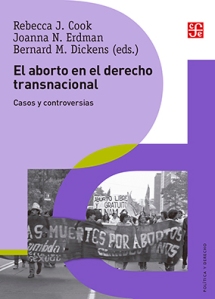SUBSCRIBE TO REPROHEALTHLAW: To receive these updates monthly by email, enter your address in upper right corner of this webpage, then check your email to confirm the subscription.
COLLOQUIUM:
Overcoming Barriers to Safe Abortion in the African Region, 16-17 January 2020, at the University of Pretoria’s Centre for Human Rights. Details, funding, topics, and Call for Abstracts
DEVELOPMENTS:
El Salvador – Young woman acquitted of aggravated homicide after miscarriage in 2016. Evelyn Hernandez Cruz was released on appeal, July 10, 2019. News report.
Germany: Higher court overturns doctor’s conviction for “advertising” abortion among other health services, in light of recent legal reform. News report, July 3, 2019.
Kenya – Case of “JMM,” a teenager who died in 2015 after botched illegal abortion. The High Court of Kenya at Nairobi, Constitutional and Human Rights Division, declared that abortion is permitted for rape victims. It also ruled that the Ministry of Health’s 2014 withdrawal of abortion “Standards and Guidelines” and abortion trainings for healthcare professionals, were arbitrary and unlawful. Federation of Women Lawyers (Fida – Kenya) & 3 others v Attorney General & 2 others; East Africa Center for Law & Justice & 6 others (Interested Party) & Women’s Link Worldwide & 2 others (Amicus Curiae) [2019] eKLR, Petition No. 266 of 2015. Decision of June 11, 2019. News report. Press release by Center for Reproductive Rights.
Northern Ireland – U.K. bill to maintain Northern Ireland’s public services during governmental hiatus includes decriminalized abortion and same-sex marriage. Bill was signed into law July 24, 2019, to take effect October 22, 2019. Time Magazine: “After 158 Years.”
United Kingdom: Court of Appeal upholds legality of a buffer zone around a London abortion clinic. Dulgheriu and Orthova v. the London Borough for Civil Liberties and The National Council for Civil Liberties [2019] EWCA Civ 1490, Case No: C1/2018/1699 Court of Appeal (Civil Division). (Decision of August 21, 2019) Report by Safe Abortion.
United Nations, International Law Commission, UN 71st session, A/CN.4/L.935 May 15, 2019, adopted new edition of “Crimes against Humanity” treaty, which “removed the outdated definition of gender … [It] affirmed that the rights of women, LGBTIQ persons, and other marginalized groups are protected in international criminal law, which will have ripple effects across national laws and future legal mechanisms for years to come,” according to Jessica Stern et al. New edition of Treaty.
SCHOLARSHIP:
[abortion law, Brazil] “Why is decriminalization necessary? by the Anis Bioethical Institute (Brasilia, 2019). The booklet is now available in English, Spanish and Portuguese : scroll down on this webpage.
[abortion law, Chile ] “Criminalisation under scrutiny: how constitutional courts are changing their narrative by using public health evidence in abortion cases,” by Verónica Undurraga, Sexual and Reproductive Health Matters 2019;27(1) DOI: 10.1080/26410397.2019.1620552 Article and abstract
[abortion law, Mexico] “Motherhood or Punishment: The criminalization of abortion in Mexico.” English 57-page report, 2019, English executive summary. Based on “Maternidad o Castigo: La criminalización del aborto en Mexico,” (Mexico, GIRE, 2018) Informe de 72 paginas.
[abortion law – United Kingdom] “Female Autonomy, Foetal Personhood and the English Legal Stance on Abortion Practice,” by Sahra Paula Thomet, Queen Mary Law Journal 10 (2019): 27-50. Institutional Access.
[abortion pill – Canada] “To Solve Abortion Pill Prescription Problems, We need to Rethink the Prescription Itself” by Professor Joanna Erdman, Dalhousie Law School, July 17, 2019 Newspaper Comment.
[age-of-marriage, Mali] “A commentary on the African Court’s decision in the case APDF and IHRDA v Republic of Mali: why socio-cultural endemic factors of a society could never support arguments based on force majeure” by Giulia Pecorella, International Law Blog, January 14, 2019. Comment online. Decision PDF.
“Gender Equality, Norms, and Health” 5-part series in The Lancet Vol. 393 provides new analysis and insights into the impact of gender inequalities and norms on health, and opportunities to transform them. ArticlesGender Equality Norms and Health series.
“Integrating Gender Perspectives in Gynaecology and Obstetrics: Engaging Medical Colleges in Maharashtra, India,” by Sangeeta Rege, Padma Bhate-Deosthali, Pravin Shingare, Srinivas Gadappa, Sonali Deshpande, Nandkishore Gaikwad, and Shailesh Vaidya, International Journal of Gynecology and Obstetrics 146 (2019): 132–138 PDF at Wiley Online. Submitted text at SSRN.
US-focused news, resources, and legal developments are available on Repro Rights Prof Blog. View or subscribe.
JOBS
Links to employers in the field of Reproductive and Sexual Health Law are online here.
______________
Compiled by: the International Reproductive and Sexual Health Law Program, reprohealth*law at utoronto.ca. See Program website for our Publications, Information resources, and Reprohealthlaw Commentaries Series. TO JOIN THE REPROHEALTHLAW BLOG: enter your email address in the upper right corner of our blog, then check your email to confirm the subscription.



 Posted by reprohealthlaw
Posted by reprohealthlaw 



